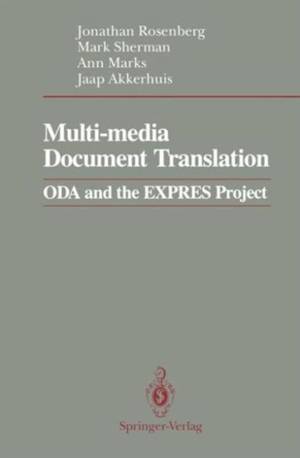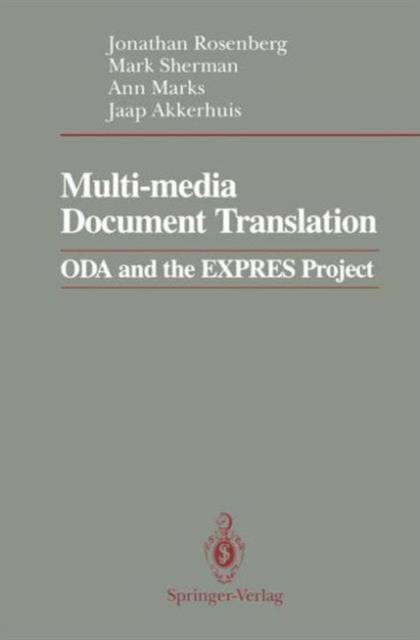
- Afhalen na 1 uur in een winkel met voorraad
- Gratis thuislevering in België vanaf € 30
- Ruim aanbod met 7 miljoen producten
- Afhalen na 1 uur in een winkel met voorraad
- Gratis thuislevering in België vanaf € 30
- Ruim aanbod met 7 miljoen producten
Zoeken
Multi-Media Document Translation
Oda and the Expres Project
Jonathan Rosenberg, Mark Sherman, Ann Marks, Jaap Akkerhuis
Paperback | Engels
€ 128,95
+ 257 punten
Omschrijving
As part of the NSF's EXPRES project, the authors investigated ways to interchange multi-media documents among diverse systems. Their investigations led to an analysis and implementation of multi-media document format translation in general, and of the ODA standard in particular. ODA, Office Document Architecture, is a new ISO and CCITT international standard for representing multi- media documents. The results of their investigations are presented in this book. The book contains overview information about multi-media document architecture and formats, an introduction to ODA, detailed technical specifications on how to use ODA for multi-media document format translation, and the authors' experiences in implementing and using ODA. The book also contains a complete user manual for the authors' publically available ODA software: tool kits for manipulating ODA and raster formats, tools for examining ODA documents and sample translators between ODA and several other multi-media formats. This book provides comprehensive information about ODA for a large audience. Planners can get basic information about using ODA for interoperation of multi-media systems. Researchers receive detailed discussions about the advantages and problems of using ODA for document representation, format translation and archival storage. System designers can use the technical descriptions of translators and tools in specifying their own. System builders can easily obtain the software as a basis for prototyping and investigating their own ODA implementations.
Specificaties
Betrokkenen
- Auteur(s):
- Uitgeverij:
Inhoud
- Aantal bladzijden:
- 783
- Taal:
- Engels
Eigenschappen
- Productcode (EAN):
- 9781468464061
- Verschijningsdatum:
- 16/03/2012
- Uitvoering:
- Paperback
- Formaat:
- Trade paperback (VS)
- Afmetingen:
- 156 mm x 234 mm
- Gewicht:
- 1120 g

Alleen bij Standaard Boekhandel
+ 257 punten op je klantenkaart van Standaard Boekhandel
Beoordelingen
We publiceren alleen reviews die voldoen aan de voorwaarden voor reviews. Bekijk onze voorwaarden voor reviews.







